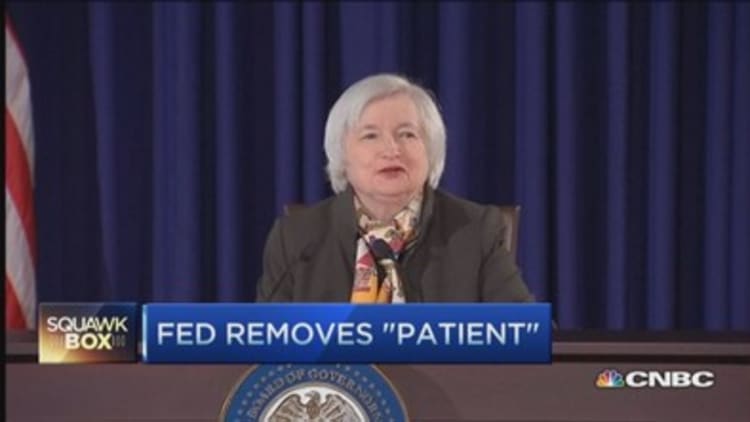
The Federal Reserve is potentially limiting its ability to deal with a future economic downturn by taking "baby steps" to raise interest rates, the chief U.S. economist at UBS said Thursday.
"You need in good times to build up a reserve of basis points so that when bad times come you can ease again," Maury Harris said on CNBC's "Squawk Box." "If they're going to be in such [slow-motion] when they tighten, heaven help us when there's a real problem and they need to cut rates and they don't have much left."
The central bank's Federal Open Market Committee said Wednesday it was unlikely at its April meeting to begin increasing its near-zero percent federal funds rate, the interest charged for short-term lending among financial institutions.
Read MoreFed removes 'patient' but says no April hike coming
It also removed the closely watched world "patient" from the statement, indicating that a rate hike is closer. However, Fed Chair Janet Yellen told reporters following the FOMC meeting, "just because we removed the word 'patient' does not mean we will become impatient."
That decision marked a compromise among FOMC members and a bid to shore up the central bank's credibility, Harris said. Yellen's recent comments suggesting a moderate pace of interest rate hikes was inconsistent with some FOMC members' forecasts, he added.
"This makes her rhetoric more credible because they brought their own fed funds rate forecast back down to what indeed would be a very moderate pace of tightening," he said.
Tim Ng, managing director at Clearbrook Global Advisors, said on "Squawk Box" he shared that opinion. He added that the Fed was aiming to avoid a surprise that would trigger a selloff in markets.
He said there's little liquidity in markets, and bids for bonds—even investment-grade bonds—have dried up. A drop in bond offerings means investors have fewer options for relatively safe and stable investments.
Read More The yield trade could be back on
"There's so much money chasing yields, chasing overpriced assets that have nowhere else to go," he said. "When it begins to unravel, it could be a real avalanche in terms of price movements."
He pointed to the money flowing into exchange traded funds, particularly from retail investors. "They really don't understand what they own, but in the end when prices begin to unravel, and the market starts to decrease and correct, they're going to have a serious issue seeing tremendous drops in prices."
Ng noted that in just a matter of weeks between February and March, the 10-year bond yield went from 1.60 to 2.20. While a 60-basis point movement does not seem like a lot, it is actually a dramatic move from a 1.60 base.
"If you think about that now across the spectrum of fixed income, that could be really dramatic price movements," he said.


